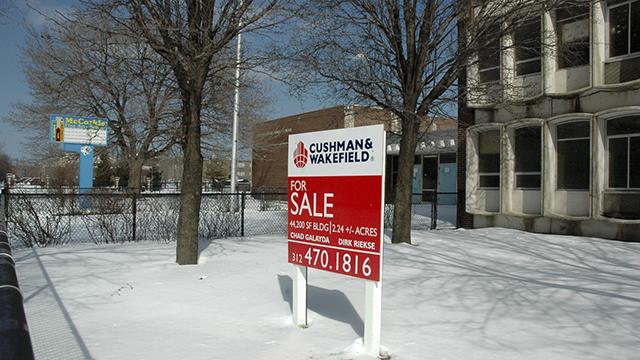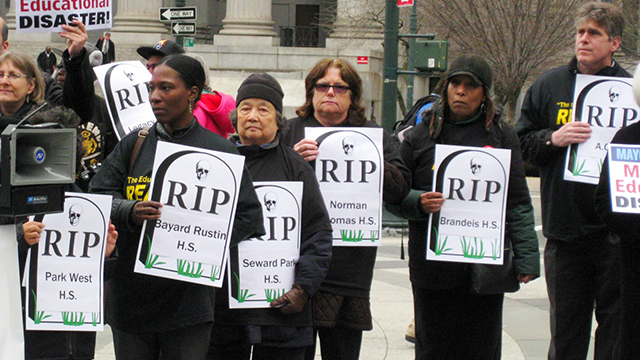
Boos and hisses fills the auditorium of Brooklyn Technical High as the governing board for New York City's public schools, the Panel on Education Policy, takes the stage. It's March 11 and the PEP is meeting to consider a proposal from Schools Chancellor Dennis Walcott to close nearly two dozen schools.
Parent after parent, teacher after teacher, student after student takes the microphone and pleads for their school to remain open.
Similar scenarios are consistently playing out in many parts of the country. Officials in Chicago last week announced plans to eliminate fifty-four schools next year in one swoop. The city's mayor, former Obama White House Chief of Staff, Rahm Emanuel, was on vacation at the time of the announcement and could not be reached for comment.
Earlier this month twenty-three schools got the axe in Philadelphia, about ten percent of the city's total. Nineteen protestors, including American Federation of Teachers head Randi Weingarten, were arrested for attempting to block the entrance to the building where Philly's education reform committee dished out the guillotine treatment.
In New York, these PEP meetings have become a tired ritual. Everybody knows what to expect, and this evening's turnout is not what it has been in the past. Last year, a group calling itself Occupy the DOE – Department of Education – held an alternative, and louder, meeting while the panel was in session; the voices of parents, students and educators frequently drowned out those who sat on stage with microphones at their lips.
Tonight, there's a significant crowd on hand but it falls far short of years before. The United Teachers Federation, which represents educators in New York, hasn't even bothered to mobilize its members, apparently preferring to bide its time until the mayoral election in November when, presumably, someone more amenable than billionaire Michael Bloomberg will be in office.
Following in the footsteps of many who came before him, Bloomberg systematically underfunded the city's institutions of learning. Simultaneously, his Department of Ed has ramped up standardized testing -- a cash cow for giant publishing houses like Houghton-Mifflin-Harcourt and Pearson, who design the tests used to measure whether schools are making the grade or whether the DOE will toss them overboard.
“We have a responsibility not to react to emotions,” said School's Chancellor Dennis Walcott, whose responses to reporters' questions before the hearing rolled off his tongue with robotic speed and efficiency. “We have a responsibility to act to facts. The facts are that schools are not doing well.”
The mayor, whom Walcott answers to, has the ability to appoint a supermajority of members to the PEP. He's used his power to bolt-up 140 schools that weren't “doing well” during his decade-plus reign. In Brooklyn Tech's auditorium this evening, that number reached 162.
Meanwhile, for approximately every public school the DOE has crossed off its books, a charter school has opened up. Charter's are frequently non-union. They receive public funding but are privately run, sometimes by for-profit educational management firms.
In New York, hedge funds have lobbed large sums of money into charters and often sit on their boards. “Hedge fund executives,” The New York Times has noted, are developing into a “significant political counterweight” to teachers unions and other advocates of public education.
When it comes to an increased emphasis on testing, charters have a key advantage over traditional public schools: they can cross students off their grading sheets if they're not meeting their academic standards. Often that means students with learning disabilities get shown the door.
By contrast, public schools have to take everybody. Public school teachers attest that students with learning disabilities, behavioral problems, or who speak English as a second language commonly enter their classrooms well after semesters have started.
The roots of the charter model, which is gradually phasing out and replacing traditional public institutions in New York and nationwide, go back to ideological experiments implemented abroad -- specifically, under the dictatorship of Augusto Pinochet who seized power in Chile in 1971.
“The first iteration of this project to privatize education, to control what people thought was under Pinochet,” says Dr. Lois Weiner who has written extensively on the decline of America's public education system. The model was crafted by the World Bank, she says, which used Chile as a neoliberal petri dish in the 1970s.
From there the privatization project spread throughout Latin America where a number of dictators backed by the U.S. and international financiers ruled the roost. Out of Latin America, neoliberal education crossed oceans to Asia and Africa, chasing troubled economies like fire through dry brush.
Weiner says the scenario typically went something like this: “'Oh, you want money to build a bridge?' That means modernizing your education system. And what do they mean by modernize? They mean standardized tests, they mean charter schools, they mean dismantling teachers unions.”
Britain's Margaret Thatcher brought the privatized model to Europe, where it later spread to countries in the former Eastern Block still dizzy from the fall of the Soviet empire.
Charter-friendly legislation passed by President Bill Clinton in the 1990s helped the neoliberal education model grow roots in the U.S. In the following decade, President's George W. Bush's “No Child Left Behind” bill, followed by Obama's “Race to the Top” program, tied school funding to test results, further facilitating the dismantling of public education.
Arne Duncan, the current Education Secretary, has bragged of his ambition to continue on a federal scale what he accomplished as head of Chicago schools: mass school shutterings and the propagation of charters.
The emphasis on standardized tests to measure student achievement goes back much farther, however, and is laced with racism. Harvard President James Bryant Conant, a firm believer that an intellectual elite must govern the unwashed masses, laid the ground for the modern standardized testing system in the 1930s when he enlisted Princeton psychology professor Carl Brigham to design an aptitude test for students seeking college admission.
Brigham was an ardent member of the eugenics movement, whose adherents claimed physical traits such as skin color could serve as moral and intellectual indicators. Brigham developed what would later serve as a pathfinder example of standardized testing: the SAT, or Scholastic Aptitude Test, which is still widely used as a benchmark for college admissions.
At the PEP hearing in Brooklyn, the racist elitism pioneered by Brigham and Conant was alive and well, with test results serving as a justification to shut the city's working class, black and brown youth out of their schools. An ongoing lawsuit from the UFT accuses the Department of Ed of violating chapter six of the 1964 Civil Rights barring discrimination from programs accepting federal dollars, since the majority of those impacted by the closings hail from communities of color.
Yet while the city's Department of Ed has used test results to qualify the closings, they have likewise resisted testing classrooms for Polychlorinated biphenyl, or PCBs. The once widely used, highly toxic electrical coolant pioneered by Monsanto was banned by Congress in 1979. Advocates with New York Lawyers for Public Interest have identified 1,200 city schools either contaminated or potentially contaminated with PCBs. But the DOE refuses to test the air in classrooms for traces of the toxin, despite warnings from the Environmental Protection Agency. “Our kids are essentially being poisoned,” said Noah Gotbaum, a parent of three children in the school system. “The DOE says, 'No, don't worry.'”
Gotbaum was elected to serve on his local Community Education Council in Harlem, a body meant to give parents a voice in the schooling of their children. But he says the “tin-pan dictatorship” of the PEP are the ones pulling the strings, regardless of input from parents.
In one example, last December, Gotbaum says he and other parents learned from a three-line advertisement in Crain's New York that a triad of public schools in Manhattan were slated for demolition, to be replaced by high-income housing. In testimony before the PEP on Mar 11, Gotbaum complained that “the borough president was not told. Parents were not told. I'll tell you who was told: the developers. You are rushing to destroy our schools.”
Like the UFT, Gotbaum is hoping New York's next mayoral administration will place a higher value on democracy than the Bloomberg administration. Other's think a fresh approach is needed,
The Movement of Rank-and-File Educators, or MORE, is attempting to take over the teachers union in elections slated for April. They want to push the UFT more toward a social justice approach. “What MORE would do differently,” says Julie Cavanagh, a Brooklyn school teacher and MORE candidate for the UFT's presidency, “is change the philosophy and ideology of how the union functions.” That means building “real organic partnerships with the communities that we serve.”
MORE has modeled itself on the Caucus of Rank-and-File Educators, which took over the Chicago teachers union in 2010 and led a strike that fought back attempts to cut teacher pay last June. They attribute their success cooperation from the community. Parents and students joined the Chicago teachers on the picket-line. The strike was seen as being about more than a contract, but about the systemic racism within the city's underfunded public schools.
Decked in red t-shirts, members of MORE were out in force at the PEP hearing, standing by parents and students where the UFT leadership was absent. Their hope is that those with a mutual stake in preserving public education can band together to beat back the privatization of learning and build a quality school environment for all.
Those wondering what the scenario would look like, should schooling go the opposite way, might examine Louisiana where Hurricane Katrina has provided an impetus for the overhaul the state's education system. Legislation approved by lawmakers in 2011 gives corporations the ability to govern charter schools and decide who gets in and who doesn't -- provided, of course, that they are the ones subsidizing the school.
Asked what would happen should a porno shop, strip club or gambling establishment enter into this quid-pro-quo arrangement, Louisiana State Senator Julie Quinn replied: "I think we would welcome a business, casino or otherwise.”
Up north, bodies young and old shuffled out of Brooklyn Tech late on the evening of the 11th. On the stage panel members appointed by the mayor had executed 22 schools simply by raising their arms when it came time to vote. A number of specialty schools were among those given the boot, including the Law, Government and Community Service High School in Queens.
Watching the proceedings, Noah Gotbaum wondered aloud, “What are we teaching our youth about democracy?”
3 WAYS TO SHOW YOUR SUPPORT
- Log in to post comments
















